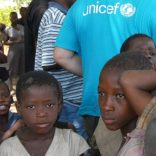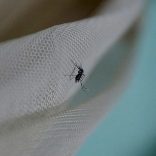Children killed in Mozambique election violence: HRW
Mozambique: Health authorities record 9,000 cases of cholera in seven provinces

FILE - For illustration purposes only. [File photo: VOA Portugues]
The health authorities in Mozambique have counted around 9,000 cases of cholera in seven provinces, the country’s minister of health, Armindo Tiago, has said.
“We have around 9,000 cases of cholera across the country and the vaccination system that has been established in Mozambique and globally is the result of a lack of sufficient vaccines to carry out preventive vaccination. So what we are doing is emergency prevention in places where there is an outbreak,” Tiago told journalists after handing over medical supplies at Maputo Central Hospital on Thursday.
The province most affected by the current wave of this cholera outbreak is Nampula, with a cumulative 3,000 cases and 12 deaths, followed by Tete, with 1,853 cases and six deaths since October, according to data from the National Directorate of Public Health.
In addition to Nampula, the cholera outbreak is affecting Niassa, Cabo Delgado, Zambézia, Manica, Tete and Sofala, with 30 deaths recorded since October, according to the organisation.
The vaccination campaign launched by the authorities this week aims to reach 2.2 million people in the areas affected by cholera, but misinformation about the disease has been a challenge for the authorities, especially in rural areas.
“At the moment the biggest problem we have is misinformation,” emphasised the minister.
In December, at least five people died following a wave of misinformation about cholera, said the commander-general of Mozambique’s national police, Bernardino Rafael.
The victims are mostly local leaders and health technicians who were killed by locals on allegations that they were bringing cholera cases to the communities in question, explained Rafael during a rally in Chiure, Cabo Delgado, a province where the authorities have recorded some of these cases.
Between May and November, at least 16 people were arrested in Sofala province, in the centre of Mozambique, for passing on misinformation about cholera, the authorities said.
Cholera is a treatable disease that causes severe diarrhoea and can lead to death from dehydration if not tackled promptly.
It is largely caused by the ingestion of contaminated food and water due to a lack of sanitation networks.
In May, the World Health Organization warned that the world will have a shortage of cholera vaccines by 2025 and that one billion people in 43 countries could be infected with the disease; in October it said Mozambique was one of the countries most at risk.
Mozambique is considered to be one of the countries most severely affected by climate change in the world, a situation that exacerbates the lack of infrastructure and services to prevent the disease.












Leave a Reply
Be the First to Comment!
You must be logged in to post a comment.
You must be logged in to post a comment.